The Impact of Nationalism on Global Conflict and Political Stability
VerifiedAdded on 2023/04/06
|6
|1192
|238
Essay
AI Summary
This essay delves into the multifaceted role of nationalism in exacerbating global conflict and instability. It critically examines the historical and contemporary influence of nationalistic ideologies on international relations, drawing on scholarly research and analysis. The paper explores how nationalism, characterized by distinct foreign policy preferences, can intensify conflicts, potentially leading to military interventions or deterring risk-taking. Furthermore, it investigates the impact of nationalism on democratizing nations, ethnic groups, and the broader global political landscape. The essay also assesses the relevance of nationalism in contemporary world politics, considering its rise in various countries and its implications for international peace and cooperation. The conclusion synthesizes these findings, highlighting the complex and evolving nature of nationalism's impact on the global stage.
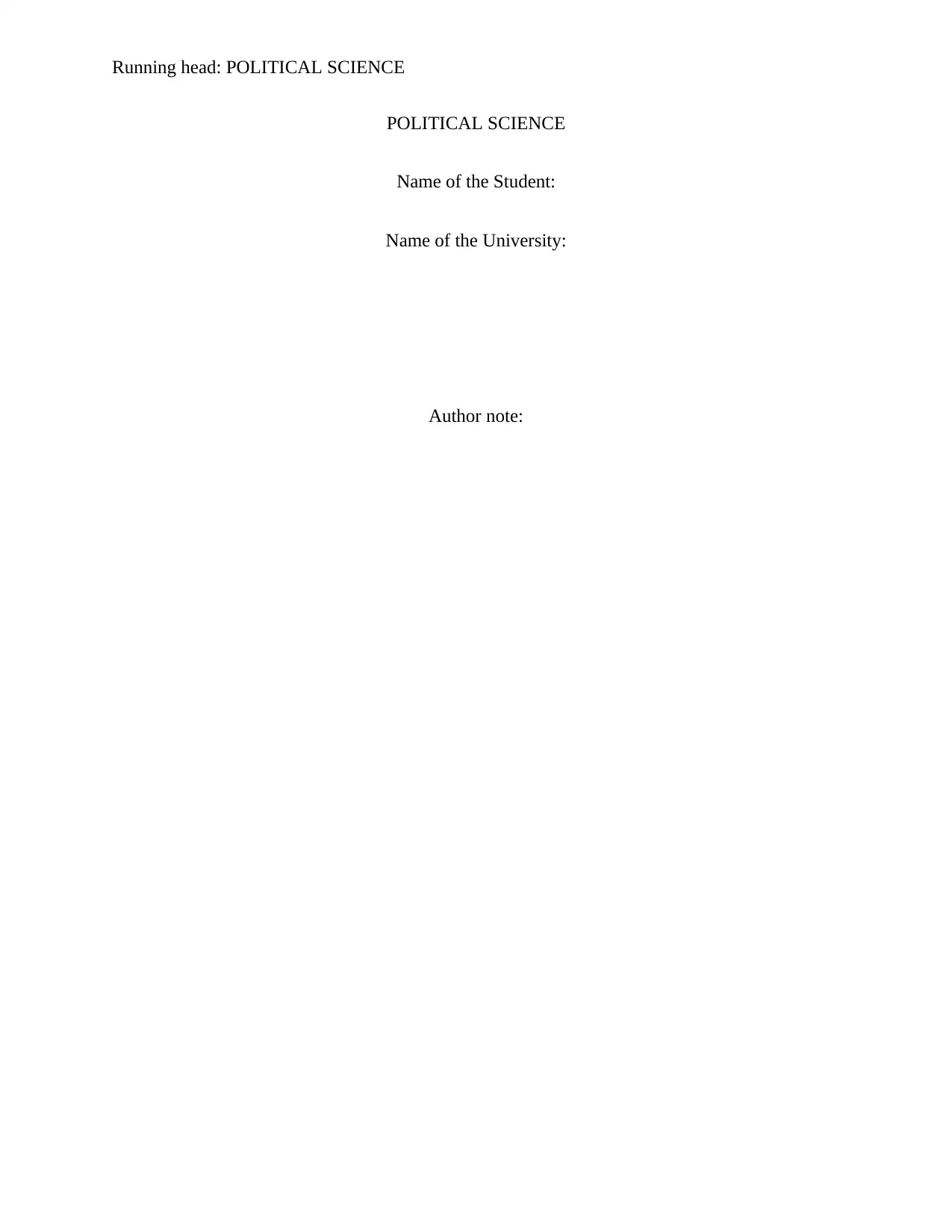
Running head: POLITICAL SCIENCE
POLITICAL SCIENCE
Name of the Student:
Name of the University:
Author note:
POLITICAL SCIENCE
Name of the Student:
Name of the University:
Author note:
Paraphrase This Document
Need a fresh take? Get an instant paraphrase of this document with our AI Paraphraser
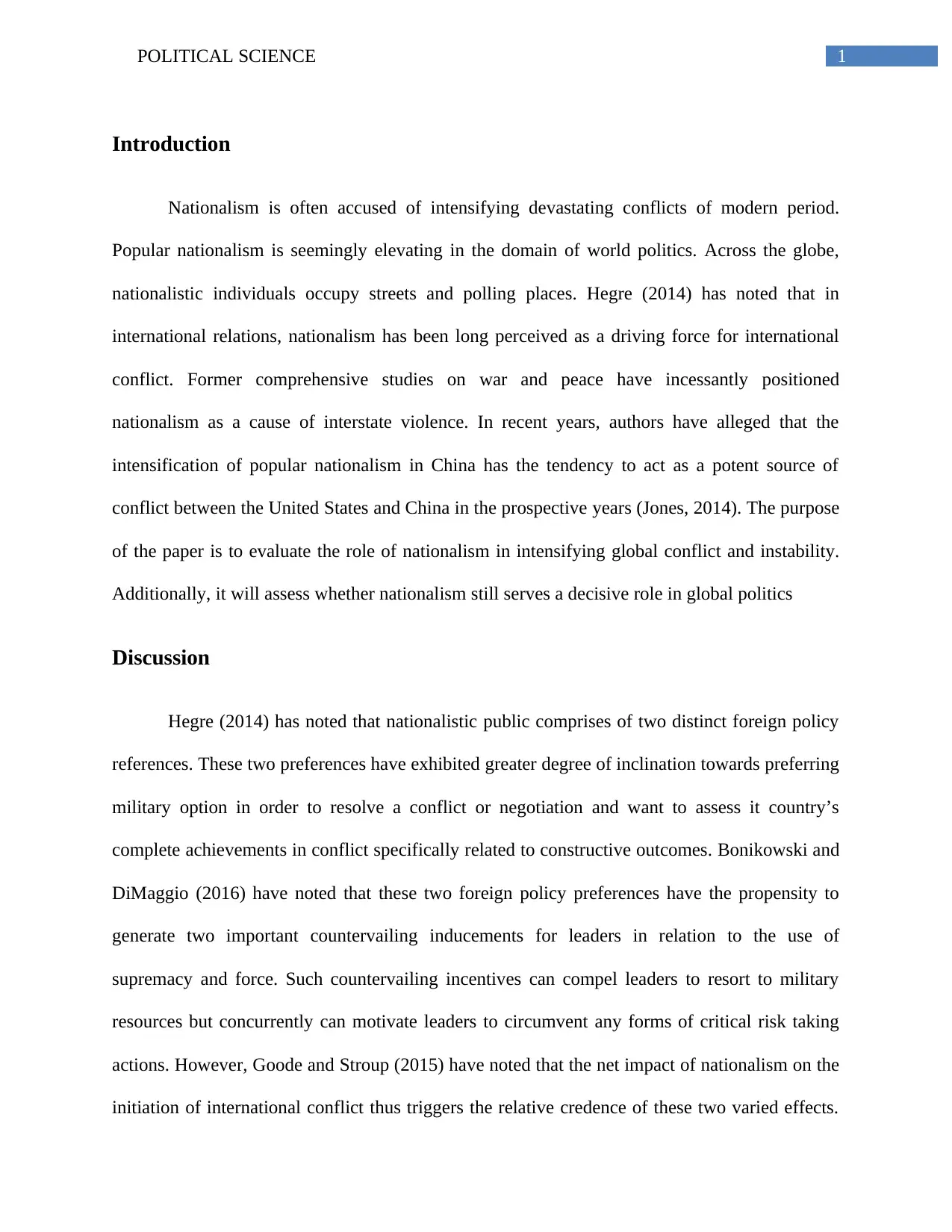
1POLITICAL SCIENCE
Introduction
Nationalism is often accused of intensifying devastating conflicts of modern period.
Popular nationalism is seemingly elevating in the domain of world politics. Across the globe,
nationalistic individuals occupy streets and polling places. Hegre (2014) has noted that in
international relations, nationalism has been long perceived as a driving force for international
conflict. Former comprehensive studies on war and peace have incessantly positioned
nationalism as a cause of interstate violence. In recent years, authors have alleged that the
intensification of popular nationalism in China has the tendency to act as a potent source of
conflict between the United States and China in the prospective years (Jones, 2014). The purpose
of the paper is to evaluate the role of nationalism in intensifying global conflict and instability.
Additionally, it will assess whether nationalism still serves a decisive role in global politics
Discussion
Hegre (2014) has noted that nationalistic public comprises of two distinct foreign policy
references. These two preferences have exhibited greater degree of inclination towards preferring
military option in order to resolve a conflict or negotiation and want to assess it country’s
complete achievements in conflict specifically related to constructive outcomes. Bonikowski and
DiMaggio (2016) have noted that these two foreign policy preferences have the propensity to
generate two important countervailing inducements for leaders in relation to the use of
supremacy and force. Such countervailing incentives can compel leaders to resort to military
resources but concurrently can motivate leaders to circumvent any forms of critical risk taking
actions. However, Goode and Stroup (2015) have noted that the net impact of nationalism on the
initiation of international conflict thus triggers the relative credence of these two varied effects.
Introduction
Nationalism is often accused of intensifying devastating conflicts of modern period.
Popular nationalism is seemingly elevating in the domain of world politics. Across the globe,
nationalistic individuals occupy streets and polling places. Hegre (2014) has noted that in
international relations, nationalism has been long perceived as a driving force for international
conflict. Former comprehensive studies on war and peace have incessantly positioned
nationalism as a cause of interstate violence. In recent years, authors have alleged that the
intensification of popular nationalism in China has the tendency to act as a potent source of
conflict between the United States and China in the prospective years (Jones, 2014). The purpose
of the paper is to evaluate the role of nationalism in intensifying global conflict and instability.
Additionally, it will assess whether nationalism still serves a decisive role in global politics
Discussion
Hegre (2014) has noted that nationalistic public comprises of two distinct foreign policy
references. These two preferences have exhibited greater degree of inclination towards preferring
military option in order to resolve a conflict or negotiation and want to assess it country’s
complete achievements in conflict specifically related to constructive outcomes. Bonikowski and
DiMaggio (2016) have noted that these two foreign policy preferences have the propensity to
generate two important countervailing inducements for leaders in relation to the use of
supremacy and force. Such countervailing incentives can compel leaders to resort to military
resources but concurrently can motivate leaders to circumvent any forms of critical risk taking
actions. However, Goode and Stroup (2015) have noted that the net impact of nationalism on the
initiation of international conflict thus triggers the relative credence of these two varied effects.
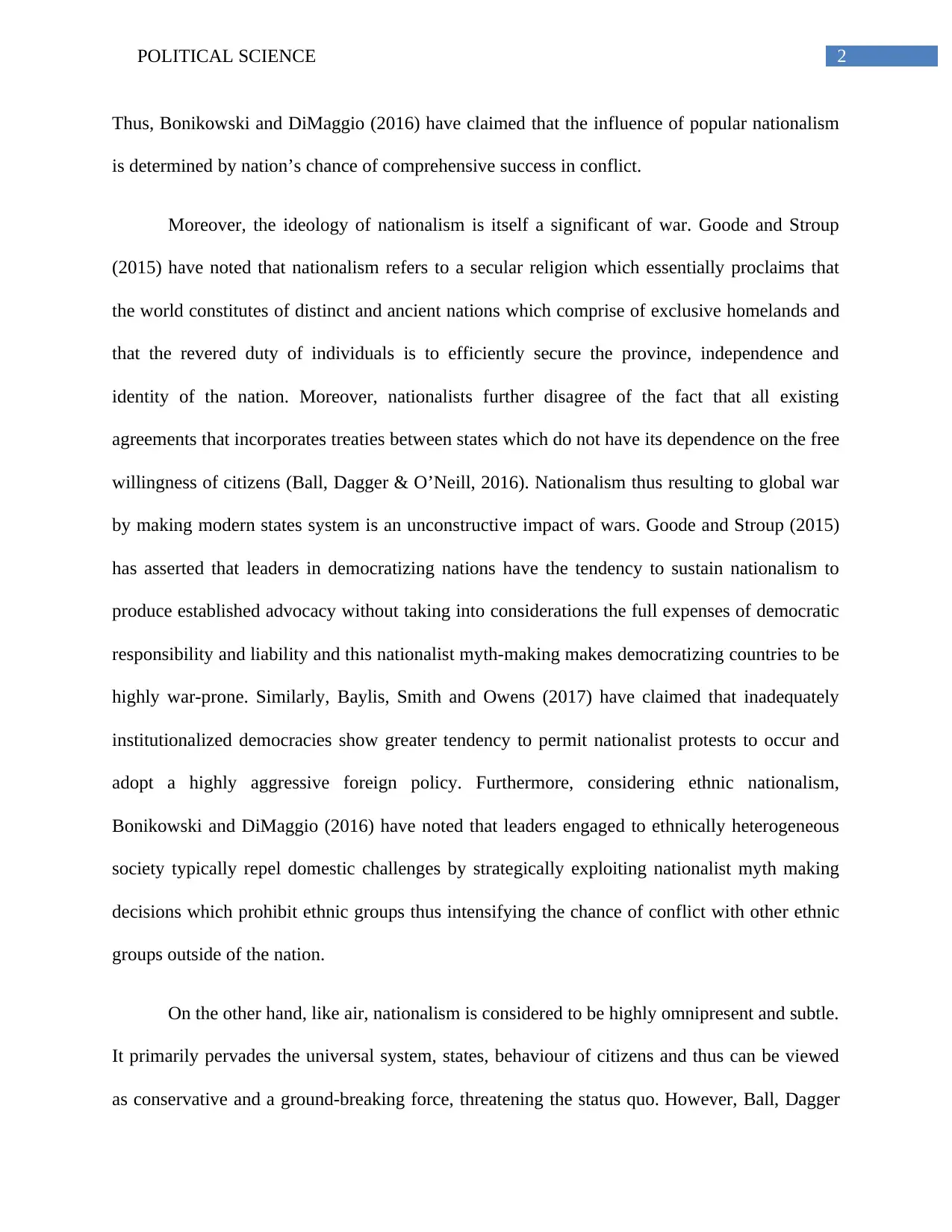
2POLITICAL SCIENCE
Thus, Bonikowski and DiMaggio (2016) have claimed that the influence of popular nationalism
is determined by nation’s chance of comprehensive success in conflict.
Moreover, the ideology of nationalism is itself a significant of war. Goode and Stroup
(2015) have noted that nationalism refers to a secular religion which essentially proclaims that
the world constitutes of distinct and ancient nations which comprise of exclusive homelands and
that the revered duty of individuals is to efficiently secure the province, independence and
identity of the nation. Moreover, nationalists further disagree of the fact that all existing
agreements that incorporates treaties between states which do not have its dependence on the free
willingness of citizens (Ball, Dagger & O’Neill, 2016). Nationalism thus resulting to global war
by making modern states system is an unconstructive impact of wars. Goode and Stroup (2015)
has asserted that leaders in democratizing nations have the tendency to sustain nationalism to
produce established advocacy without taking into considerations the full expenses of democratic
responsibility and liability and this nationalist myth-making makes democratizing countries to be
highly war-prone. Similarly, Baylis, Smith and Owens (2017) have claimed that inadequately
institutionalized democracies show greater tendency to permit nationalist protests to occur and
adopt a highly aggressive foreign policy. Furthermore, considering ethnic nationalism,
Bonikowski and DiMaggio (2016) have noted that leaders engaged to ethnically heterogeneous
society typically repel domestic challenges by strategically exploiting nationalist myth making
decisions which prohibit ethnic groups thus intensifying the chance of conflict with other ethnic
groups outside of the nation.
On the other hand, like air, nationalism is considered to be highly omnipresent and subtle.
It primarily pervades the universal system, states, behaviour of citizens and thus can be viewed
as conservative and a ground-breaking force, threatening the status quo. However, Ball, Dagger
Thus, Bonikowski and DiMaggio (2016) have claimed that the influence of popular nationalism
is determined by nation’s chance of comprehensive success in conflict.
Moreover, the ideology of nationalism is itself a significant of war. Goode and Stroup
(2015) have noted that nationalism refers to a secular religion which essentially proclaims that
the world constitutes of distinct and ancient nations which comprise of exclusive homelands and
that the revered duty of individuals is to efficiently secure the province, independence and
identity of the nation. Moreover, nationalists further disagree of the fact that all existing
agreements that incorporates treaties between states which do not have its dependence on the free
willingness of citizens (Ball, Dagger & O’Neill, 2016). Nationalism thus resulting to global war
by making modern states system is an unconstructive impact of wars. Goode and Stroup (2015)
has asserted that leaders in democratizing nations have the tendency to sustain nationalism to
produce established advocacy without taking into considerations the full expenses of democratic
responsibility and liability and this nationalist myth-making makes democratizing countries to be
highly war-prone. Similarly, Baylis, Smith and Owens (2017) have claimed that inadequately
institutionalized democracies show greater tendency to permit nationalist protests to occur and
adopt a highly aggressive foreign policy. Furthermore, considering ethnic nationalism,
Bonikowski and DiMaggio (2016) have noted that leaders engaged to ethnically heterogeneous
society typically repel domestic challenges by strategically exploiting nationalist myth making
decisions which prohibit ethnic groups thus intensifying the chance of conflict with other ethnic
groups outside of the nation.
On the other hand, like air, nationalism is considered to be highly omnipresent and subtle.
It primarily pervades the universal system, states, behaviour of citizens and thus can be viewed
as conservative and a ground-breaking force, threatening the status quo. However, Ball, Dagger
⊘ This is a preview!⊘
Do you want full access?
Subscribe today to unlock all pages.

Trusted by 1+ million students worldwide
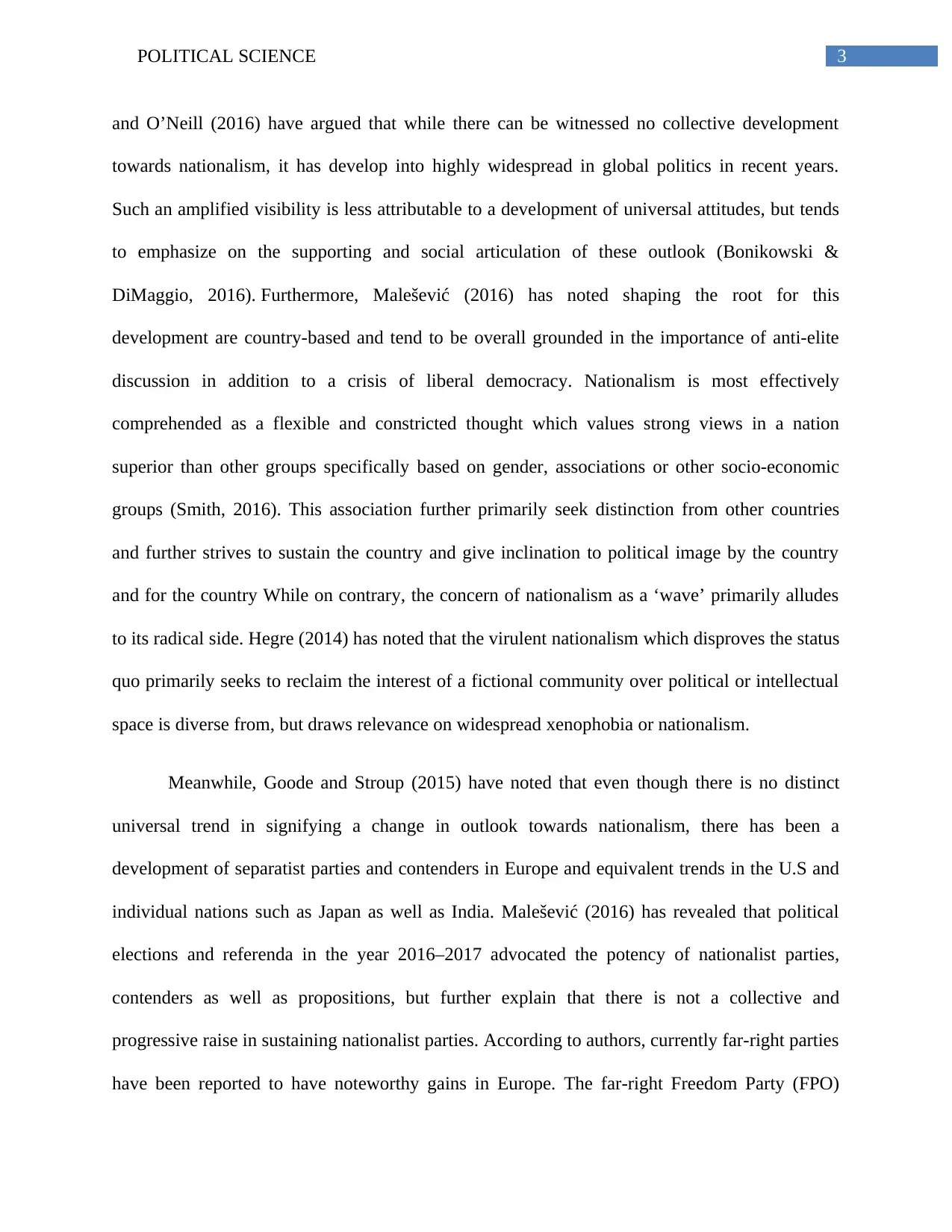
3POLITICAL SCIENCE
and O’Neill (2016) have argued that while there can be witnessed no collective development
towards nationalism, it has develop into highly widespread in global politics in recent years.
Such an amplified visibility is less attributable to a development of universal attitudes, but tends
to emphasize on the supporting and social articulation of these outlook (Bonikowski &
DiMaggio, 2016). Furthermore, Malešević (2016) has noted shaping the root for this
development are country-based and tend to be overall grounded in the importance of anti-elite
discussion in addition to a crisis of liberal democracy. Nationalism is most effectively
comprehended as a flexible and constricted thought which values strong views in a nation
superior than other groups specifically based on gender, associations or other socio-economic
groups (Smith, 2016). This association further primarily seek distinction from other countries
and further strives to sustain the country and give inclination to political image by the country
and for the country While on contrary, the concern of nationalism as a ‘wave’ primarily alludes
to its radical side. Hegre (2014) has noted that the virulent nationalism which disproves the status
quo primarily seeks to reclaim the interest of a fictional community over political or intellectual
space is diverse from, but draws relevance on widespread xenophobia or nationalism.
Meanwhile, Goode and Stroup (2015) have noted that even though there is no distinct
universal trend in signifying a change in outlook towards nationalism, there has been a
development of separatist parties and contenders in Europe and equivalent trends in the U.S and
individual nations such as Japan as well as India. Malešević (2016) has revealed that political
elections and referenda in the year 2016–2017 advocated the potency of nationalist parties,
contenders as well as propositions, but further explain that there is not a collective and
progressive raise in sustaining nationalist parties. According to authors, currently far-right parties
have been reported to have noteworthy gains in Europe. The far-right Freedom Party (FPO)
and O’Neill (2016) have argued that while there can be witnessed no collective development
towards nationalism, it has develop into highly widespread in global politics in recent years.
Such an amplified visibility is less attributable to a development of universal attitudes, but tends
to emphasize on the supporting and social articulation of these outlook (Bonikowski &
DiMaggio, 2016). Furthermore, Malešević (2016) has noted shaping the root for this
development are country-based and tend to be overall grounded in the importance of anti-elite
discussion in addition to a crisis of liberal democracy. Nationalism is most effectively
comprehended as a flexible and constricted thought which values strong views in a nation
superior than other groups specifically based on gender, associations or other socio-economic
groups (Smith, 2016). This association further primarily seek distinction from other countries
and further strives to sustain the country and give inclination to political image by the country
and for the country While on contrary, the concern of nationalism as a ‘wave’ primarily alludes
to its radical side. Hegre (2014) has noted that the virulent nationalism which disproves the status
quo primarily seeks to reclaim the interest of a fictional community over political or intellectual
space is diverse from, but draws relevance on widespread xenophobia or nationalism.
Meanwhile, Goode and Stroup (2015) have noted that even though there is no distinct
universal trend in signifying a change in outlook towards nationalism, there has been a
development of separatist parties and contenders in Europe and equivalent trends in the U.S and
individual nations such as Japan as well as India. Malešević (2016) has revealed that political
elections and referenda in the year 2016–2017 advocated the potency of nationalist parties,
contenders as well as propositions, but further explain that there is not a collective and
progressive raise in sustaining nationalist parties. According to authors, currently far-right parties
have been reported to have noteworthy gains in Europe. The far-right Freedom Party (FPO)
Paraphrase This Document
Need a fresh take? Get an instant paraphrase of this document with our AI Paraphraser
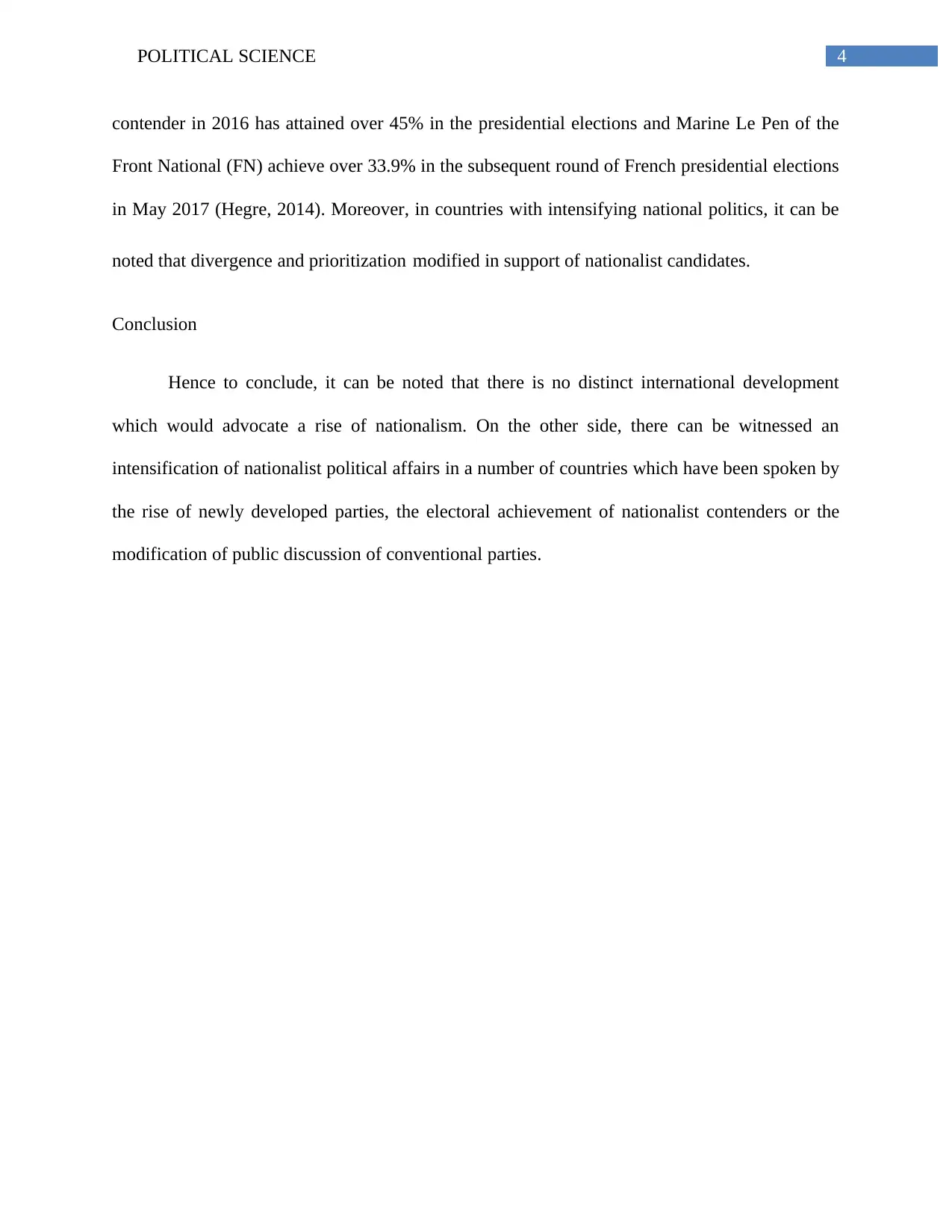
4POLITICAL SCIENCE
contender in 2016 has attained over 45% in the presidential elections and Marine Le Pen of the
Front National (FN) achieve over 33.9% in the subsequent round of French presidential elections
in May 2017 (Hegre, 2014). Moreover, in countries with intensifying national politics, it can be
noted that divergence and prioritization modified in support of nationalist candidates.
Conclusion
Hence to conclude, it can be noted that there is no distinct international development
which would advocate a rise of nationalism. On the other side, there can be witnessed an
intensification of nationalist political affairs in a number of countries which have been spoken by
the rise of newly developed parties, the electoral achievement of nationalist contenders or the
modification of public discussion of conventional parties.
contender in 2016 has attained over 45% in the presidential elections and Marine Le Pen of the
Front National (FN) achieve over 33.9% in the subsequent round of French presidential elections
in May 2017 (Hegre, 2014). Moreover, in countries with intensifying national politics, it can be
noted that divergence and prioritization modified in support of nationalist candidates.
Conclusion
Hence to conclude, it can be noted that there is no distinct international development
which would advocate a rise of nationalism. On the other side, there can be witnessed an
intensification of nationalist political affairs in a number of countries which have been spoken by
the rise of newly developed parties, the electoral achievement of nationalist contenders or the
modification of public discussion of conventional parties.
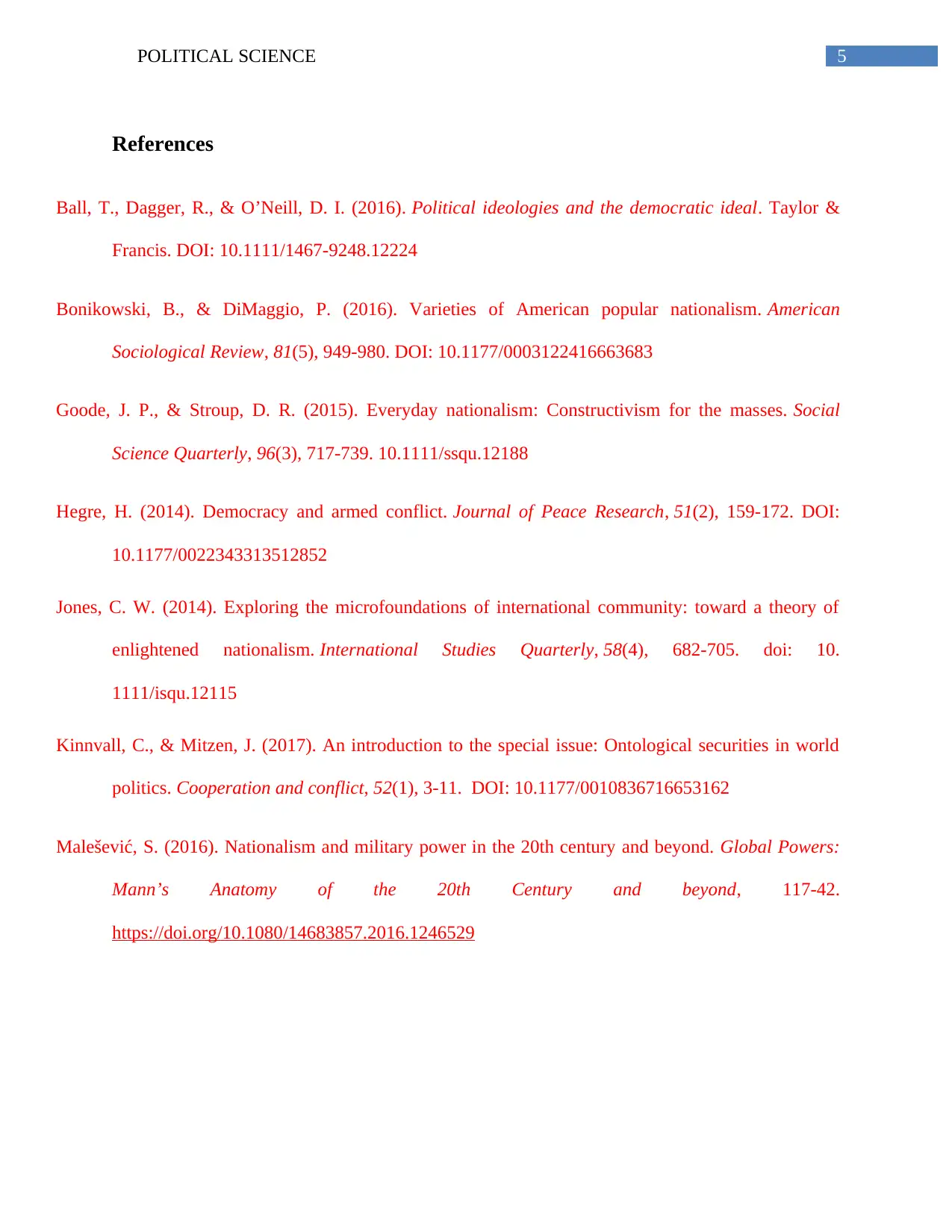
5POLITICAL SCIENCE
References
Ball, T., Dagger, R., & O’Neill, D. I. (2016). Political ideologies and the democratic ideal. Taylor &
Francis. DOI: 10.1111/1467-9248.12224
Bonikowski, B., & DiMaggio, P. (2016). Varieties of American popular nationalism. American
Sociological Review, 81(5), 949-980. DOI: 10.1177/0003122416663683
Goode, J. P., & Stroup, D. R. (2015). Everyday nationalism: Constructivism for the masses. Social
Science Quarterly, 96(3), 717-739. 10.1111/ssqu.12188
Hegre, H. (2014). Democracy and armed conflict. Journal of Peace Research, 51(2), 159-172. DOI:
10.1177/0022343313512852
Jones, C. W. (2014). Exploring the microfoundations of international community: toward a theory of
enlightened nationalism. International Studies Quarterly, 58(4), 682-705. doi: 10.
1111/isqu.12115
Kinnvall, C., & Mitzen, J. (2017). An introduction to the special issue: Ontological securities in world
politics. Cooperation and conflict, 52(1), 3-11. DOI: 10.1177/0010836716653162
Malešević, S. (2016). Nationalism and military power in the 20th century and beyond. Global Powers:
Mann’s Anatomy of the 20th Century and beyond, 117-42.
https://doi.org/10.1080/14683857.2016.1246529
References
Ball, T., Dagger, R., & O’Neill, D. I. (2016). Political ideologies and the democratic ideal. Taylor &
Francis. DOI: 10.1111/1467-9248.12224
Bonikowski, B., & DiMaggio, P. (2016). Varieties of American popular nationalism. American
Sociological Review, 81(5), 949-980. DOI: 10.1177/0003122416663683
Goode, J. P., & Stroup, D. R. (2015). Everyday nationalism: Constructivism for the masses. Social
Science Quarterly, 96(3), 717-739. 10.1111/ssqu.12188
Hegre, H. (2014). Democracy and armed conflict. Journal of Peace Research, 51(2), 159-172. DOI:
10.1177/0022343313512852
Jones, C. W. (2014). Exploring the microfoundations of international community: toward a theory of
enlightened nationalism. International Studies Quarterly, 58(4), 682-705. doi: 10.
1111/isqu.12115
Kinnvall, C., & Mitzen, J. (2017). An introduction to the special issue: Ontological securities in world
politics. Cooperation and conflict, 52(1), 3-11. DOI: 10.1177/0010836716653162
Malešević, S. (2016). Nationalism and military power in the 20th century and beyond. Global Powers:
Mann’s Anatomy of the 20th Century and beyond, 117-42.
https://doi.org/10.1080/14683857.2016.1246529
⊘ This is a preview!⊘
Do you want full access?
Subscribe today to unlock all pages.

Trusted by 1+ million students worldwide
1 out of 6
Related Documents
Your All-in-One AI-Powered Toolkit for Academic Success.
+13062052269
info@desklib.com
Available 24*7 on WhatsApp / Email
![[object Object]](/_next/static/media/star-bottom.7253800d.svg)
Unlock your academic potential
Copyright © 2020–2025 A2Z Services. All Rights Reserved. Developed and managed by ZUCOL.



